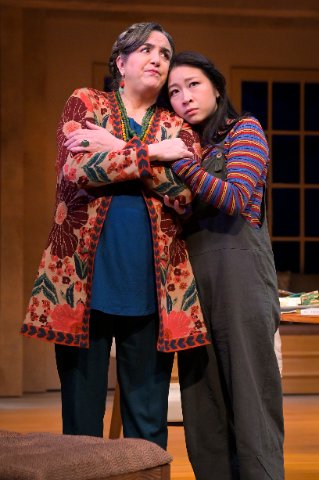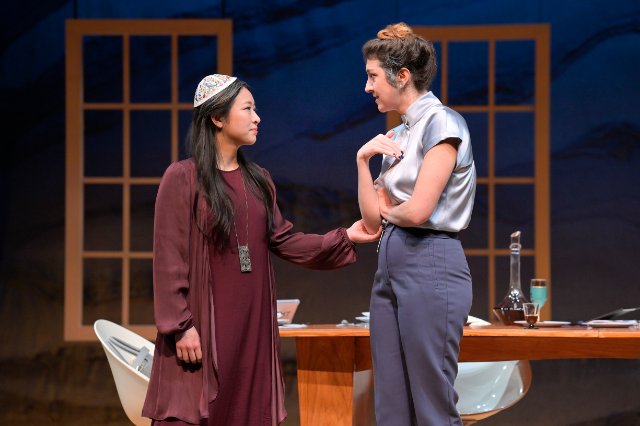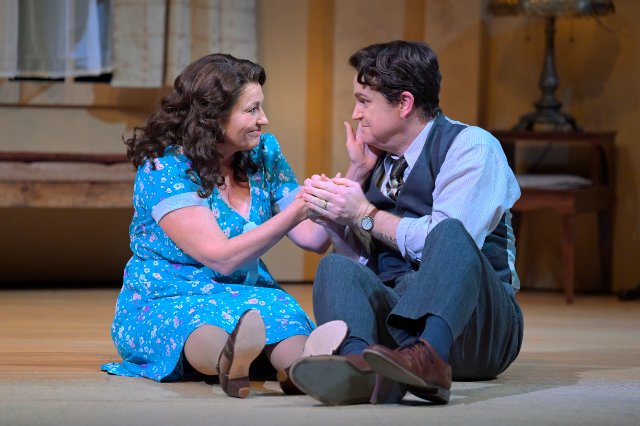In Every Generation
Family dynamics and seder through the years.
By: Victor Cordell - Jan 24, 2023
“Mah nishtanah, ha-laylah ha-zeh,mi-kol ha-leylot” (Why is this night different from all other nights?). This invocation, spoken by the youngest capable person at the dinner table at seder, is perhaps the most famous and evocative sentence in Judaism. Not only does the ritual that follows those words reflect on the traumatic history of the Jewish people, but it speaks to their very existence. So begins playwright Ali Viterbi’s poignant, insightful, and sweeping, yet frustrating “In Every Generation.”
The riveting Act 1 (or Part 1 in the playwright’s specification) takes place in present time at the Los Angeles home of an esteemed, female professor at UCLA, Valeria Levi, who has divorced her former husband, a rabbi, caught in flagrante delicto with another woman. The family celebrates seder.
Valeria is joined by her parents, Paola and Davide, WWII refugees from Italy. The father survived a concentration camp but is now without speech, in the advanced stages of amyotrophic lateral sclerosis (Lou Gehrig’s disease). Two young adult women fill out the table. Daughter Yael, or Yaya, studies at Yale and is home on break. The eye catcher in this scenario is Dev, the older daughter. Why? It happens that she is adopted, and Chinese by birth and appearance.
The animated table is full of love and arguments. As Valeria simply notes, Jews argue. All of the discussions relate to Judaism in one way or another. At the same time, each topic has corollaries in other groups. Or at least, non-Jews can empathize with the contrasting positions. The passionate differences demonstrate the multiplicity of thought within the community.
Some issues reflect differing degrees of reverence and religious practice, with Valeria being among the least worshipful in the family. Even though the talented Cindy Goldfield’s Valeria prepares the seder feast for the others, she still insists on having her Diet Coke and comfort food. Not surprisingly, Dev conveys the strongest commitment to religion, as often happens with converts. Yet, the devout and dutiful Dev, as portrayed by Sarah Lo with an occasional sense of differentness, will confront her nagging curiosity about her origin and the isolation of being an outsider within outsiders.
A never-ending discussion about Judaism is whether it represents ethnicity or religion. The sad truth is that the decision on that point is more often made by those hostile to the community, and invariably to the detriment of the adherents. Friction arises between the daughters on Jewish identity, even though Yaya, played by Olivia Nicole Hoffman with intellectual confidence but physical insecurity, behaves in a very secular manner. While not meaning to discriminate or denigrate the adopted sister, Yaya suggests that Dev fits in a different category, without the same baggage as ethnic Jews. But then she uncorks the unexpected. She relates a study about predisposition toward anxiety and trauma that the children of Holocaust survivors might experience, with interesting insights into the nature versus nurture conflict.
The discussions in Part 1 keep the audience in rapt attention, and the performances are spot on. Production defects concern communication. Because of the direction that some actors face, some audience members cannot hear them completely. And with the frequency of overlapping talk by characters and the occasional use of both Italian and Hebrew, numerous attendees felt they were missing a lot, even though supertitles appeared with most of the foreign language spoken.
While Act 1 takes place in real time, it reveals history and relationships with reasonable depth. In Act 2, the playwright attempts to convert the remaining stage time into an epic built around seder celebrations. Three scenes, or parts, cover radically different periods.
The first scene after intermission, Part 2, is a flashback to 1954, when Paola and Davide are recent arrivals in the United States, and suffer through the scarcity and sparseness of the new immigrant experience. The situations they cope with are touching and relatable. However, they don’t really set up a strong context for what had occurred in Act 1. But the actors deliver the goods. Luisa Sermol steals the stage whenever she is on it. Flippant and dismissive as the nonna in Act 1, she is now young, earthy, and saucy. Michael Champlin, the dying and voiceless nonno in Act 1, is an anxious and guilt-ridden survivor of Auschwitz in this part.
Part 3 flashes forward to a highly dystopian year 2050. This episode continues the message from Act 1 and depicts the further divergence between the sisters. Given today’s growing and overt white supremacy movement with increasingly brutal racism, antisemitism, and victimization of immigrants, it offers a chilling potential reality. The whole scenario is disturbing and unpleasant to think about but can’t be dismissed.
This apocalyptic vision tragically suggests that the coming depravity is driven not only by its perpetrators, but also by the victims’ inability to muster the wherewithal to confront it for the existential threat that it is. Unfortunately, history does repeat itself. A case in point is the dramatization of Sinclair Lewis’s 1935 novel “It Can’t Happen Here” which was performed at Berkeley Rep in 2016. Among its reviews, some prominent ones dismissed the plot as unrealistic to apply to this country because of our history and systems. Within weeks, the sad unravelling of American democracy began.
The final part enacts a seder in 1406 BCE, shortly after the Jews have escaped from Egypt. All of the other Jewish-centric vignettes possess universalisms and dramatic impact. Many viewers might find this tale a bit self-indulgent and lacking in drama and connectedness.
In sum, “In Every Generation” has much to say, and says much effectively. However, this reviewer feels that as a theatrical production, the scope of the narrative overreaches and the plot points are not cleanly aligned. Yet, it entertains and provokes.
In this era of political correctness, word police, and ad hominem attributions, I would like to say something about my own bona fides. I am a Christian-reared, half-Sicilian who has rejected organized religion. My wife of 50 years, who is also my editor, is a secular Jew. We both feel extremely supportive of the other’s community. Anything in this review that may be construed as unsympathetic to Jewish identity and its people’s right to live peacefully and autonomously is incorrect.
“In Every Generation,” written by Ali Viterbi, is produced by TheatreWorks Silicon Valley, and plays at Mountain View Center for the Performing Arts, 500 Castro Street, Mountain View, CA through February 12, 2023.





